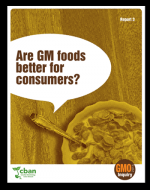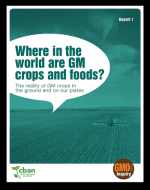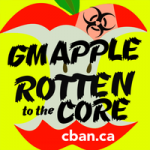GMO-free news from Canada
25.05.2016 | permalink
More Big Retailers Say 'No' to GMO Salmon
On the heels of Canada’s approval of GMO salmon, Friends of the Earth U.S. and a coalition of more than 30 consumer, health, food safety and fishing groups released updated numbers Wednesday showing that nearly 80 major food retailers have committed to not sell genetically engineered salmon, despite FDA’s approval last November.
“Despite irresponsible approvals, the growing number of commitments from retailers demonstrates there is no market for GMO salmon,” Dana Perls, senior food and technology campaigner with Friends of the Earth, said. “Retailers and restaurants are wisely listening to their customers and rejecting GMO salmon.”
Albertsons Companies, owner of Albertsons, Safeway, Vons, ACME, Shaw’s and others, stated its commitment to not sell GMO salmon.
- ecowatch: More Big Retailers Say 'No' to GMO Salmon
- Canadian Biotechnology Action Network - CBAN: GE Fish / GM fish approved by Health Canada
- The Chronicle Herald: Nova Scotia says no to genetically modified fish
- ecowatch: Canada Approves GMO Salmon
- The Guardian: Canada approves sale of genetically modified salmon
25.03.2016 | permalink
Health Canada, CFIA approve genetically engineered potato with reduced browning
TORONTO — Health Canada and the Canadian Food Inspection Agency have approved a genetically engineered potato for sale, said a U.S.-based company on Monday in announcing that its non-browning spuds could be in Canadian supermarkets by Thanksgiving.
J.R. Simplot Company was notified by both agencies in letters dated March 18 that it could sell its potatoes — which purportedly are less likely to bruise or turn brown when cut — to consumers or for livestock consumption.
24.11.2015 | permalink
Are GM crops better for farmers?
Report 4 | November 2015
GMO Inquiry 2015’s fourth report investigates the impacts of genetically modified crops on farmers in Canada over the past twenty years.
Have GM crops benefited farmers? Have they increased yields and farm incomes? And what are the costs of herbicide-resistant weeds and GM contamination for farmers?
27.10.2015 | permalink
Canada: Study Exposes AquaBounty's Bogus Growth Claims on GMO Salmon
For those of you who have read the Mary Shelley novel “Frankenstein,” you remember that the name refers to the scientist Victor Frankenstein, not the monster he constructed from body parts found in the local cemetery. The story has captured the public’s imagination for nearly 200 years, and “franken” has become a common prefix—and a pejorative—for genetically modified organisms (GMOs), which are made with cut-and-pasted genetic material from different species of plants, animals and microorganisms.
29.09.2015 | permalink

88 per cent of Canadians want GMO foods labeled
New Poll Shows Canadians are Highly Concerned About GM Foods and Want Mandatory Labelling
September 29, 2015.
Ottawa, ON. A national Ipsos Reid poll commissioned by the Canadian Biotechnology Action Network (CBAN) reveals 88 per cent of Canadians want genetically modified (GM) foods labeled on grocery store shelves. Of the over 1000 Canadians polled, over half oppose genetically modifying crops and animals to produce food.
“Our poll shows that Canadians have a range of concerns about genetically modified foods,” said Lucy Sharratt of CBAN. “The vast majority of Canadians who want labelling just want to know what’s in the food they’re eating. Canadians are also concerned about safety, the environmental impacts and some have ethical concerns about genetically modifying plants and animals.”
Since the first GM foods were approved for sale in Canada twenty years ago, polls have consistently shown that the overwhelming majority of Canadians want mandatory labelling.
The new poll comes as the world’s first GM food animal – a GM Atlantic salmon – is pending approval from Health Canada. “45 per cent of Canadians polled said they definitely don’t want to eat the GM fish, but without labelling how can they make this choice?” asked Thibault Rehn of Vigilance OGM.
- Canadian Biotechnology Action Network - CBAN: New Poll Shows Canadians are Highly Concerned About GM Foods and Want Mandatory Labelling
- GMO Inquiry 2015: Are GM foods better for consumers?
- Common Ground: GM crops wreak havoc with ecosystems and health
- GMO FREE EUROPE 2015: Canada: Impacts and Lessons from 20 Years of GMOs
21.09.2015 | permalink
4 GM crops are currently grown in Canada
It's been 20 years since genetically engineered (GE; also called genetically modified or GM) crops and foods were first introduced into Canada.
Only 4 GE crops are currently grown in Canada:
canola
corn
soy
sugar beet (white sugar beet for sugar processing)
These 4 crops end up on our grocery store shelves as processed food ingredients and are also widely used for animal feed and to make biofuels. These crops are engineered to be either insect resistant or herbicide tolerant, and many now carry both traits.
We could also be importing a small amount of:
5. GE papaya (from Hawaii)
6. GE squash - some varieties of yellow crookneck squash (from the US)
7. GE cottonseed oil
8. milk products from the US made with the use of recombinant Bovine Growth Hormone
- Canadian Biotechnology Action Network - CBAN: Canada: GE Crops and Foods (On the Market)
- Canadian Biotechnology Action Network: GMO Inquiry 2015
- Canadian Biotechnology Action Network - CBAN: Election 2015 / What is Party Policy on GMOs?
- Canadian Food Studies / La Revue canadienne des études sur l'alimentation
19.07.2015 | permalink
BIO members include Monsanto, Dow AgroSciences, BASF
BIO World Congress on Industrial Biotech 2015
BIO is the world's largest biotechnology industry lobby group. In June 2015, BIO changed its name from the Biotechnology Industry Association to the Biotechnology Innovation Association. In 2012, BIO spent $65 million dollars on its activities. BIO members include three of the six largest biotech, seed and pesticide companies in the world: Monsanto, Dow AgroSciences, BASF.
The BIO World Congress on Industrial Biotechnology is in Montreal July 19-22 and is a platform for the development and promotion of biofuels and biomass including the use of synthetic biology.
(.....)
Companies have big plans for our future – but are corporate solutions real solutions? Genetic engineering including new technologies like synthetic biology threaten to commodify every living organism, replace livelihoods and put our environment at risk.
23.03.2015 | permalink

New report: Where in the world are GM crops and foods?
Where in the world are GM crops and foods?
The reality of GM crops in the ground and on our plates
Report 1 | March 2015
In this first report of the GMO Inquiry 2015, we investigate what genetically modified (GM) crops are grown in Canada and around the world, where they are being grown, how much of each one is being grown, and where they end up in our food system.
“Where in the world are GM crops and foods?” is the first in a series of reports that investigate unanswered questions from 20 years of GMOs in Canada. Watch this space for future reports, and join us as we examine the impacts of GM crops on our environment, on our food and farming systems, and on our health.
23.03.2015 | permalink

Health Canada approved GM apple - 69% of Canadians oppose the GM apple
Okanagan residents react to Arctic Apple approval by Health Canada
KELOWNA – After more than three years waiting for approval, the Okanagan’s Arctic Apple now has the green light to hit store shelves in Canada. The genetically modified apple doesn’t turn brown and Health Canada’s approval means it could hit store shelves as early as next year.
While it may be good for Okanagan Specialty Fruits (OSF), the company behind the apple, the Okanagan Fruit Growers’ Association (BCFGA) has some concerns.
“If you’re going to let the market decide, you’re going to have to give people a reference point to make a decision based on their personal purchasing habits, and I would assume that would be through some kind of labeling,” says BCFGA president Fred Steele.
21.10.2014 | permalink
Vancouver kicks off GMO-food awareness campaign
The City of Vancouver will kick off a week of events on Tuesday morning for Non-GMO Awareness Week in an effort to promote better understanding of the issues raised by genetically modified organisms in our food system.
Consumers are generally wary of GMOs when asked by pollsters, but many people hold serious misconceptions about GMOs and the risks they pose, especially to the environment, said Trish Kelly, a member of the Vancouver Food Policy Council.
“People are concerned about GMOs, but they don’t necessarily have all the facts, so the attention of having the city make this proclamation — the first one in Canada — allows us to have conversations about a pretty complicated issue,” said Kelly.
